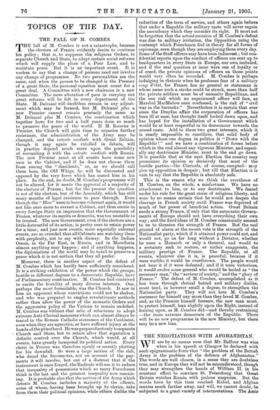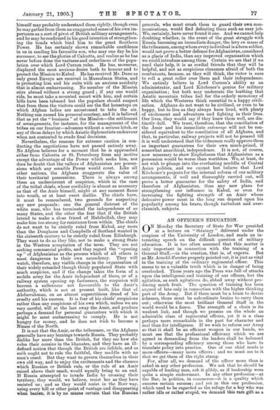-w -E are by no means sure that Mr. Balfour was
wise when in his speech at Glasgow he declared with such epigrammatic force that " the problem of the British Army is the problem of the defence of Afghanistan." The words are well chosen, in a sense they are doubtless true, and in Europe they will not be misunderstood, though they may strengthen the hands of William II. in his constant effort to convince St. Petersburg that Great Britain watches Russia with jealous suspicion. But the words have by this time reached Kabul, and Afghan centres much farther away, and will, we cannot doubt, be subjected to a great variety of interpretations. The Amir himself may probably understand them rightly, though even he may gather from them an exaggerated sense of his own im- portance as a sort of pivot of British military arrangements, and he may be confirmed in his good intention of strengthen- ing the bonds which bind him to the great Southern Power. He has certainly shown remarkable confidence in us in sending his favourite son, who may one day be his successor, to see the glories of Calcutta, and realise as he has never before done the vastness and orderliness of the popu- lation over which Lord Curzon rules. He has, moreover, displayed the most anxious desire both to honour and to protect the Mission to Kabul. He has received Mr. Dane as only great Envoys are received in Mussulman States, and is protecting him and his suite with an anxious assiduity that is almost embarrassing. No member of the. Mission stirs abroad without a strong guard ; if any one would ride, he must take a mounted escort with him, and certain hills have been tabooed lest the populace should suspect that from them the visitors could see the flat housetops on which Afghan ladies are accustomed to take the air. Nothing can exceed his personal courtesy, and it is believed that as yet the " business " of the Mission—the settlement of arrangements, for instance, for the management of the tribes on our frontier—advances without a serious hitch, or any of those delays by which Asiatic diplomatists endeavour when not contented to evade final decisions.
Nevertheless, the reasons for extreme caution in con- ducting the negotiations have not passed entirely away. No Afghan believes for a moment that he is approached either from Calcutta or St. Petersburg from any motive except the advantage of the Power which seeks him, nor does he doubt that the valleys of Afghanistan are posses- sions which any sensible Power would covet. Like all other nations, the Afghans exaggerate the value of their territorial possessions. There is always among them an undercurrent of suspicion, which in the case of the tribal chiefs, whose cordiality is almost as necessary as that of the Amir himself, might at any moment flame into wrath, or at least overt dislike. The chiefs have, it must be remembered,' two grounds for suspecting any new proposals : one the general distrust of the white man, who has terminated the independence of so many States, and the other the fear that if the British intend to make a close friend of Habibullah, they may make him too strong for resistance from within. The chiefs do not want to be strictly ruled from Kabul, any more than the Douglases and Campbells of Scotland wanted in the sixteenth century to be strictly ruled from Edinburgh. They want to do as they like, not to- make a strong State in the Western acceptation of the term. They are not seeking commercial profits, and they regard the " opening up " of Afghanistan as the process which of all others is most dangerous to their own ascendency. They will watch, therefore, any visible change in the organisation of their widely extended though thinly populated State with much suspicion, and if the change takes the form of a Mobile army for the Amir independent of them, or of a railway system opening up fastnesses, the suspicion will become a sullenness not favourable to the Amir's authority, which is not at present built, like that of Abdurrahman, on an almost superstitious dread of his cruelty and his success. It is fear of his chiefs' suspicions rather than any suspicions of his own which, unless we are very careful, will at the last sway the Amir, and produce perhaps a demand for personal guarantees with which it might be most embarrassing to comply. He is not hungry for money, and he does not wish to become a Nizam of the North.
It is not that the Amir, or the tribesmen, or the Afghans generally have any leanings towards Russia. They probably dislike her more than the British, for they see how she rules their cousins in the khanates, and they have an ill- defined notion that though the British are infidels, and as such ought not to rule the faithful, they meddle with no man's creed. But they want to govern themselves in their own old way, and to enjoy the excitements and the chances which Russian or British rule, or the rule of an Amir .raised above their reach, would equally bring to an end. If Russia attempted to invade India by crossing their territory, they would, we believe, resist her as they have resisted us ; and as they would resist in the Boer way, using every hill or other point of vantage and disappearing When beaten; it is by no means certain that the Russian generals, who must crush them to guard their own com- munications, would find defeating them such an easy job. We, certainly, have never found it one. And we cannot help doubting whether, in the event of the great struggle with Russia becoming an immediate danger, the levy en masse of the tribesmen, among whom everyindividual is aborn soldier, would not prove a better defence forAfghanistan, considered as a glacis of India, than any improved organisation which we could introduce among them. Certain we are that if we need their help, it is as cordial friends that they will 'be helpful, and not as suspicious clansmen afraid of both the combatants, because, as they will think, the victor is sure to roll a great roller over them and their independence. We entirely believe in Lord Curzon's ability as an administrator, and Lord Kitchener's genius for military organisation ; but both may underrate the loathing that Asiatic mountain tribes feel for the orderly monotony of life which the Westerns think essential to a happy civili- sation. Afghans do not want to be civilised, or even to be happy, but to live as they always have lived, with plenty of excitement and adventure and fighting in their lives. Our lives, they would say if they knew them well, are dis- tinctly dull. We trust, therefore, that the conciliation of the Amir and his immediate entourage will not be con- sidered equivalent to the conciliation of all Afghans, and that, in particular, railway projects will not be pressed till it is well understood that the tribesmen really approve them as important guarantees for their own much-prized, if somewhat anarchical, independence. It is not, of course, now necessary to show Englishmen that Afghanistan as a possession would be worse than worthless. We, at least, do not wish to plunge into the everlasting muddle of Central Asian politics, and we cannot but believe that Lord Kitchener's projects for the internal reform of our military arrangements, if well and thoroughly carried out, will prove a better guarantee for the safety of India, and therefore of Afghanistan, than any new plans for strengthening our influence in Kabul, or even for increasing the fighting strength of an Amir whose defensive power must in the long run depend upon his popularity among his brave, though turbulent and over- clannish, subjects.







































 Previous page
Previous page